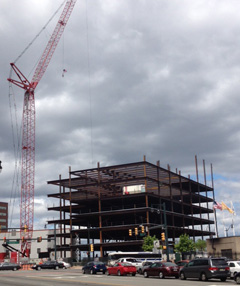NJ Contractors Give Away Their Rights

Far too often, when their invoices go unpaid, contractors and vendors make the mistake of filing lien claims against real property, to which they provided the unpaid for goods or services, using improper standardized forms obtained from "big box" stationary stores. Unfortunately, through the mere filing of these often improper lien claim forms with the County Clerk, the contractor/vendor is, in many instances, actually forfeiting its strongest assurance of getting paid for the goods and/or services it provided for the “improvement” of such property.
A. Dot your i's and cross your t's:
This forfeiture of lien rights is primarily because New Jersey’s Construction Lien Law (N.J.S.A. 2A:44A-1, et seq.) contains very specific requirements that must be satisfied prior to obtaining an enforceable lien claim. Failure to comply with these requirements prior to filing a lien claim not only renders the lien claim invalid, but also subjects the contractor/vendor who filed the improper lien claim to liability for all of the costs and expenses, including attorney’s fees, incurred by a property owner in defending or discharging the invalid lien claim.
Some examples of the prerequisites required by the New Jersey Construction Lien statute in order to maintain a valid lien claim are:
· - Filing with the County Clerk a “Notice of Unpaid Balance and Right to File Lien” (a/k/a “NUB”) (in the case of a claim for goods or services provided to residential property);
· - Filing a demand for arbitration with the American Arbitration Association (unless another alternative dispute resolution provision had previously been agreed to);
- Service of the NUB and arbitration demand “simultaneously” upon the property owner;
- Arbitrate the NUB and, in the event the arbitrator finds that a valid lien claim exists, file the lien claim with the County Clerk within ten (10) days of receipt of the arbitrator’s decision;
- Commence and action to enforce the lien claim in the Superior Court of New Jersey, Law Division, within one year of the date on which the goods and/or services were last provided to the improvement of the property.
The foregoing is far from a complete list of all of the nuances and prerequisites required by New Jersey’s Construction Lien Law to preserve a valid lien claim. However, failure to comply with any one of those listed above, as well as the myriad of others requirements, results in the contractor/vendor’s permanent loss of its statutorily granted lien rights.
B. Time is of the essence:
Another mistake frequently made by contractors and vendors resulting in a permanent forfeiture of their lien rights against real property improved by their good and/or services, is their failure to preserve their rights within the time required under the statute. In most cases, the contractor or vendor is either careless in its billing practices or is lulled into a false sense of security through the promise of payment. In the meantime, the strict statutory timeframe within which the contractor/vendor must take action to preserve its lien rights ticks away and, eventually, expires. At that point, the unpaid contractor/vendor’s only recourse is to bring an action against its client (be it the property owner or third party) without the leverage of lien rights against the subject property.
Some examples of the time requirements under New Jersey’s Construction Lien Law are as follows:
- A lien claim must be filed with the County Clerk within ninety (90) days from the date following the last date the goods and/or services in dispute were provided. In the case of residential property, requiring the filing of a NUB and completion of arbitration, timing is of particular concern given the amount of time these two steps will take, resulting in a very short window within which the lien claimant must preserve its rights;
- Service of the lien claim upon the property owner must be completed within ten (10) days of filing the lien claim;
- Commencement of an action to enforce the lien claim must be within one year following the last date the good and/or services in dispute were provided;
- In the event the lien claimant receives proper demand, commencement of an action in the Superior Court of New Jersey, Law Division, to perfect its lien claim within thirty (30) days thereafter.
Again, the foregoing is not an exhaustive list of the time requirements established by the statute. Depending upon the type of product or service, in addition to the type of property the product or service was provided to, the time requirements may be difficult to firmly establish and/or comply with. Notwithstanding, these time requirements are strictly construed by the courts and failure to comply with them will likely result in the loss of a contractor/vendor’s valid lien claim.
If you need assistance in protecting your lien rights under the NJ Construction Lien Law, contact Kelly Law, P.C.
